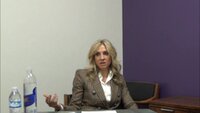| Title |
Limpert, Trina OH19_046 |
| Creator |
Weber State University, Stewart Library: Oral History Program. |
| Contributors |
Limpert, Trina, Interviewee; Thompson, Michael, Interviewer; Stokes, Alexis, Video Technician |
| Description |
The Beyond Suffrage Project was initiated to examine the impact women have had on northern Utah. Weber State University explored and documented women past and present who have influenced the history of the community, the development of education, and are bringing the area forward for the next generation. The project looked at how the 19th Amendment gave women a voice and representation, and was the catalyst for the way women became involved in the progress of the local area. The project examines the 50 years (1870-1920) before the amendment, the decades to follow and how women are making history today. |
| Abstract |
The following is an oral history interview with Trina Williams Limpert, conducted on November 5, 2018, in the Archives Conference Room at the Stewart Library, by Michael Thompson. Trina discusses her life and her memories at Weber State University. Alexis Stokes, the video technician, and Kandice Harris are also present during this interview.; The following is a video clip of an oral history interview with Trina Limpert, conducted on November 5, 2018. In this video clip, Trina provides advice to girls and women interested in pursuing careers in the STEM field. |
| Image Captions |
Trina Limpert 5 November 2018; Trina Limpert advising women interested in pursuing careers in STEM |
| Subject |
State universities and colleges; Universities and colleges; College campuses; College students; Computer Science; Women in computer science |
| Keywords |
Females in STEM; 19th Amendment; Female leaders |
| Digital Publisher |
Stewart Library, Weber State University, Ogden, Utah, United States of America |
| Date |
2019 |
| Date Digital |
2019 |
| Medium |
oral histories (literary genre) |
| Spatial Coverage |
Provo, Utah, Utah, United States, http://sws.geonames.org/5780026, 40.23384, -111.65853; Logan, Cache, Utah, United States, http://sws.geonames.org/5777544, 41.73549, -111.83439; Ogden, Weber County, Utah, United States, http://sws.geonames.org/11788968, 41.22809, -111.96766 |
| Type |
Text; Image/StillImage; Image/MovingImage |
| Access Extent |
23 page PDF; Video clip is an mp4 file, 53.6 MB |
| Conversion Specifications |
Filmed using a Sony HDR-CX430V digital video camera. Sound was recorded with a Sony ECM-AW3(T) bluetooth microphone. Transcribed using Express Scribe Transcription Software Pro 6.10 Copyright NCH Software. |
| Language |
eng |
| Rights |
Materials may be used for non-profit and educational purposes, please credit University Archives; Weber State University; Music from Uppbeat (free for Creators!): https://uppbeat.io/t/simon-folwar/hope License code: KYI5VLB63GF1TXND; Music from Uppbeat (free for Creators!): https://uppbeat.io/t/yeti-music/gentle-breeze License code: IWGKRYG7XHQOMZY0 |
| Source |
Limpert, Tina OH19_046 Weber State Archives |
| Format |
application/pdf; video/mp4 |
| ARK |
ark:/87278/s62yr3xs |
| Setname |
wsu_bs_oh |
| ID |
105456 |
| Reference URL |
https://digital.weber.edu/ark:/87278/s62yr3xs |
| Title |
Limpert, Trina OH19_046 |
| Creator |
Weber State University, Stewart Library: Oral History Program. |
| Contributors |
Limpert, Trina, Interviewee; Thompson, Michael, Interviewer; Stokes, Alexis, Video Technician |
| Description |
The Beyond Suffrage Project was initiated to examine the impact women have had on northern Utah. Weber State University explored and documented women past and present who have influenced the history of the community, the development of education, and are bringing the area forward for the next generation. The project looked at how the 19th Amendment gave women a voice and representation, and was the catalyst for the way women became involved in the progress of the local area. The project examines the 50 years (1870-1920) before the amendment, the decades to follow and how women are making history today. |
| Abstract |
The following is an oral history interview with Trina Williams Limpert, conducted on November 5, 2018, in the Archives Conference Room at the Stewart Library, by Michael Thompson. Trina discusses her life and her memories at Weber State University. Alexis Stokes, the video technician, and Kandice Harris are also present during this interview. |
| Image Captions |
Trina Limpert 5 November 2018 |
| Subject |
State universities and colleges; Universities and colleges; College campuses; College students; Computer Science; Women in computer science |
| Keywords |
Females in STEM; 19th Amendment; Female leaders |
| Digital Publisher |
Stewart Library, Weber State University, Ogden, Utah, United States of America |
| Date Digital |
2019 |
| Medium |
oral histories (literary genre) |
| Spatial Coverage |
Provo, Utah, Utah, United States, http://sws.geonames.org/5780026, 40.23384, -111.65853; Logan, Cache, Utah, United States, http://sws.geonames.org/5777544, 41.73549, -111.83439; Ogden, Weber County, Utah, United States, http://sws.geonames.org/11788968, 41.22809, -111.96766 |
| Type |
Text; Image/StillImage |
| Access Extent |
23 page PDF |
| Language |
eng |
| Rights |
Materials may be used for non-profit and educational purposes, please credit University Archives; Weber State University |
| Source |
Limpert, Tina OH19_046 Weber State Archives |
| Format |
application/pdf |
| Setname |
wsu_bs_oh |
| ID |
105601 |
| Reference URL |
https://digital.weber.edu/ark:/87278/s62yr3xs/105601 |





